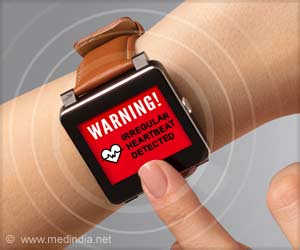
‘Atrial fibrillation (AF) is identified in around a third of all patients with ischaemic stroke, and data from stroke registries reveal that in these patients unknown, undertreated or untreated AF is responsible for most of the strokes, which are often fatal or debilitating.’
Read More..Tweet it Now
In a previous study, the use of blood thinners (anticoagulation therapy) was associated with "significantly reduced adjusted risk of stroke from 4% to 1%, and the risk of death from 7% to 4% in just 1.5 years", Lown writes.Read More..
The main risk linked with AF screening is treating false positive cases (when healthy people are wrongly identified as sick), but Lown believes that trained clinicians can accurately confirm positive irregular heartbeat diagnoses from single-lead ECGs (which record the electrical activity of the heart) and further reduce the risk of false positives.
In addition, "intermittent screening together with repeated screening every few years could reduce the risk of false negative cases" (when sick people are wrongly identified as healthy).
Lown also suggests that single lead ECG devices are "inexpensive, non-invasive, re-usable, and convenient" and can help to "greatly reduce workload."
And he notes that due to advances in algorithms and wearable technology, such as the Apple Watch, screening for irregular heartbeat could become a part of many people's daily routine "whether we like it or not."
Advertisement
While he acknowledges that there is evidence showing that screening increases the detection of irregular heartbeat, Moran argues that there are currently no studies which show that screening reduces the risk or severity of stroke, and so we don't know whether the harms inherent in any screening programme would outweigh any benefits.
Advertisement
Clinical trials aiming to address these important issues are already underway, and Moran stresses that "we must wait for their results rather than pushing ahead with implementing a costly public health intervention."
"From a policy perspective, there is also considerable ambiguity about how screening would be scaled up and implemented in practice," he says.
Furthermore, while Moran notes the rapid development in ECG diagnostics through apps and wearable devices, he says that these have "the potential to diminish the applicability of previous research carried out using older technology."
Like Lown, Moran believes that action is needed to combat the "looming epidemic" of irregular heartbeat.
But in the absence of reliable research confirming the health benefits of AF screening, he argues that the "growing international momentum" behind it should be "harnessed to ensure that important gaps in knowledge are filled."
Source-Eurekalert










